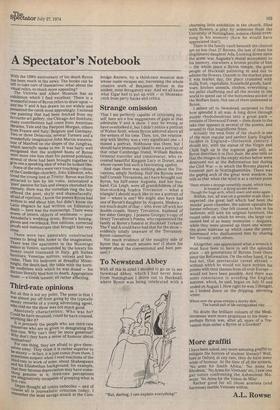A Spectator's Notebook
With the 150th anniversary of his death Byron has been much in the news. The books can be left to take care of themselves: what about the visual relics, so much more appealing? The Victoria and Albert Museum has an exhibition which I find excellent. There is a wonderful mass of Byron relics to draw upon — and the V and A has drawn its net widely and presented the catch most appealingly. I noticed one painting that had been fetched from my favourite art gallery, the Chicago Art Institute; many contributions had come from American libraries, Yale and the Pierpont Morgan, others from France and Italy, Belgium and Germany. Two or three Delacroix, several Turners and a wonderfully imaginative John Martin watercolour of Manfred on the slopes of the Jungfrau, Which specially spoke to me. It was fairly well recognised that the sculpted busts of Byron were more like him than his painted portraits; several of these had been brought together to give one a speaking idea of what he looked like. Some of the relics were very touching—those of the Cambridge choirboy, John Edleston, who loved the young lord at Trinity: Byron was first attracted to him by his voice, entertained a 'pure' passion for him and always cherished his memory. Here was the cornelian ring the boy Offered the poet, shyly and shamefacedly, afraid of rejection. I knew the poems Byron had written to and about him, but didn't know the Latin elegiacs he had written on Edleston's death.._ here was the manuscript. There were scores of letters, objects of sentiment — poor Annabella's wedding dress, Byron's boxinggloves and swordstick, first editions, corrected Proofs and manuscripts that brought him very close.
There were two admirably constructed scenes to bring him home to the imagination. There was the apartment in the Mocenigo Palace in Venice, surrounded by the luxury his nioney could command in Italy, gilt Italian furniture, Venetian mirrors, velvets and brocades. Then his bedroom at dreadful MissoInnghi, the death-bed, the table with the horrible medicines with which he was dosed — his doctors literally bled him to death. Appropriate Music — a Greek lament; all rather affecting.
Third-rate opinions
But all this is not my point. The point is that I Was almost put off from going by the typically snooty remarks of a young advertising agent, Who told me the show was notomuch good. _ Absolutely characteristic. Who was he? Could he have mounted, could he have created, anything like it?
It is precisely the people who are third-rate thrnselves who are so given to denigrating the first-rate. Why can't they be more generous?' Why don't they have a sense of humour about themselves? For one thing, they are afraid to give themselves away. They think it is rather superior to be snooty — in fact, it is just comic from them. I sometimes suspect when I read reactions of the third-rate to work of mine, about Shakespeare and his Elizabethan background, for example, that their fatuous depreciation may have something genuine in it; third-rate perceptions are imaginatively incapable of grasping what is first-rate. Degas thought all critics imbeciles — and of course all is journalistic criticism today. I remember the most savage attack in the Cam bridge Review, by a third-rate musical don whose name escapes me, traversing the whole creative work of Benjamin Britten in the snidest, most derogatory way. And we all know what Elgar had to put up with — or Shostakovitch from party hacks and critics.
Strange omission



























 Previous page
Previous page